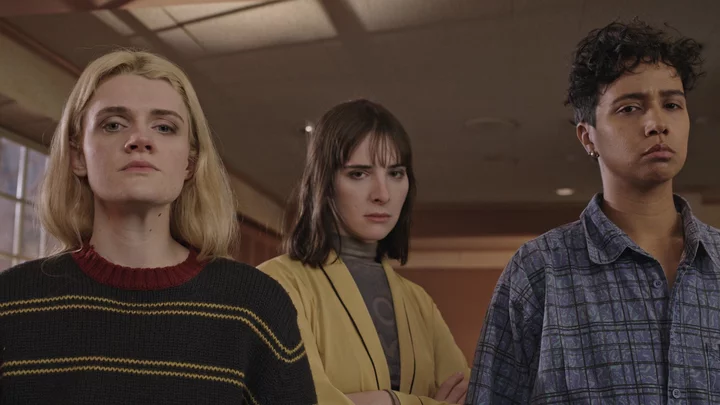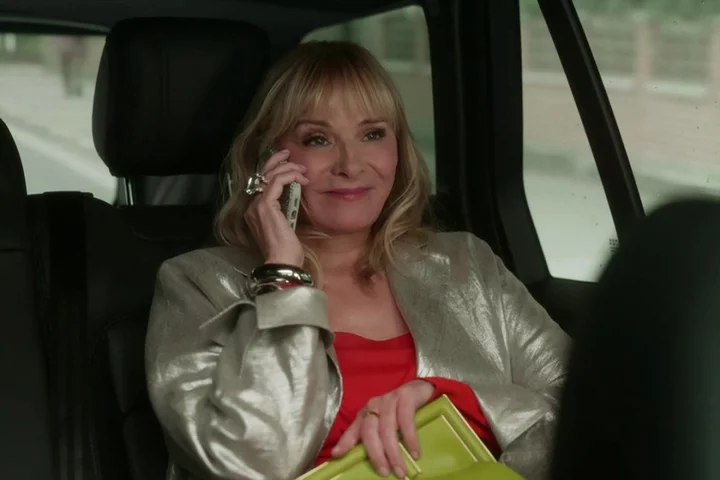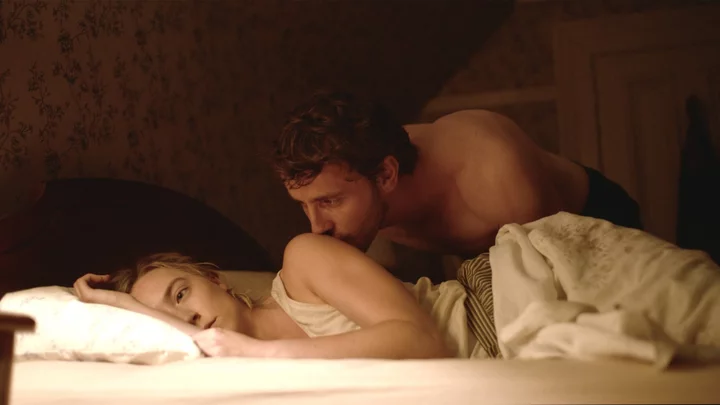Plenty of horror films don't have neat endings, but on a scale of clear to confounding, writer/director Stewart Thorndike's Bad Things definitely lands on the more head-scratching end.
So what is the hotel-based horror really about, and what does that psychologically twisted ending mean? We've done our best to break it down below.
SEE ALSO: The best movies on Shudder that you can't stream anywhere elseWhat's Bad Things about?
The premise, at least, is simple enough. Bad Things sees four friends — Ruthie (Gayle Rankin), her partner Cal (Hari Nef), Maddie (Rad Pereira), and Fran (Annabelle Dexter-Jones) — travelling to stay at Ruthie's newly inherited hotel for the weekend. The place, named the Comley Hotel, is no longer operational and Ruthie is torn between selling it (which her mysteriously absent mother, played by screen icon Molly Ringwald, apparently wants her to do) and keeping it as a business opportunity (something Cal wants her to do). Complicating it all are Ruthie's own grim childhood memories of the place, along with the fact it's supposedly haunted by the ghosts of people who've died there over the years.
Tensions among the group rise as the weekend progresses. Ruthie is clearly not herself, Fran's presence doesn't seem to be welcomed by anyone except Maddie, and cracks in Ruthie and Cal's relationship begin to appear. Soon the characters are having visions reminiscent of Stephen King's The Shining amid the halls of the Overlook Comley, and the threat of violence hangs in the air.
Featured Video For You These are the best horror films on Netflix right nowWhat happens at the end of Bad Things?
As you probably guessed, that threat turns into a reality. But the big question is: how much of it is actually real and how much is in the characters' heads?
To lay it out in the order we see it, things turn sinister when part-time hotel worker Brian (Jared Abrahamson) is stalked through the hotel and murdered by a chainsaw-wielding assailant wearing a hoodie and Ruthie's sleep mask. Later, the same assailant traps Maddie's arm in a door and slashes at her. Ruthie is held responsible by her friends, but she claims innocence.
Fran is the next to die. Attempting to take Ruthie away from the hotel with her, she's hit over the head by Cal, then pushed through a window by Ruthie. Fran survives the fall, but stumbles backwards, falling into the frozen swimming pool to her demise.
Finally, Maddie ventures into Suite 324, where she discovers Ruthie's mother, seemingly bludgeoned to death by a fire extinguisher. Maddie and Cal, realising the horrible truth, attempt to escape the hotel, but Ruthie stalks them both through the snow with the aforementioned chainsaw, and seemingly chops them to pieces.
On the surface, you could see Bad Things as a story about a woman losing her mind and going on a murderous rampage, Jack Torrance style. But is everything as it seems?
Ruthie has visions of a version of her mother played by Molly Ringwald. Credit: ShudderWhat really happened to Ruthie's mom?
The key to the story, and to Ruthie's mental state, seems to lie with the mysterious figure of Ruthie's mother, Ms. Auerbach. Writer/director Thorndike makes the importance of this relationship clear in a statement emailed to Mashable, describing Bad Things as "an unrequited ghost love story between a mother and a daughter."
"I wanted to obliterate the societal norms of what a mother and daughter are – not subtle, loving, passive, healers – but epic and frightening and active," she says. "It's a celebration of this first primal relationship and how blurry and complex that can be. Especially an unrequited one."
Indeed, Ruthie's mother's absence is almost a presence in itself right from the film's opening. Ruthie appears to be exchanging sporadic texts with her mother. When Brad is looking for Ms. Auerbach in the Comley Hotel early in the film, he observes that her car is outside, saying he wants to check her room. But Ruthie insists her mother is not in. "Her car doesn't work," she explains.
It's also clear Ruthie and her mother's relationship is strained at best, abusive at worst. We hear a story early on about how Ms. Auerbach accidentally abandoned her daughter in the hotel when she was a little girl, leaving a young Ruthie on her own for days and resulting in treatment for frostbite. There's also the implication from Cal that Ruthie's mom is putting pressure on her to sell the hotel.
It's only at the very end of the movie, though, that we realise exactly where Ms. Auerbach is: she's been lying dead in her hotel suite the entire time. The implication is that Ruthie killed her out of spite and revenge. Ruthie, it turns out, has her mom's phone, presumably texting herself the whole time.
How much blood does Ruthie really shed? Credit: ShudderDid Ruthie really go on a killing spree?
Although it seems likely that Ruthie did indeed kill her mom, the other murders in the film are a lot less clear-cut. In the final sequence, for instance, when Ruthie butchers Cal and Maddie with a chainsaw, there's a shot that shows people walking calmly by in the background as if nothing's amiss. Is it possible that the whole sequence is taking place in Ruthie's head, and by this point she's fully broken from reality? And if so, what else that happens in the hotel is only taking place in Ruthie's head?
Thorndike does such a good job of blending delusion with reality that it's difficult to say for sure. I would argue that Ruthie killing her mother really did happen, as this seems to be the trigger for everything else that follows. I also think it's likely that Ruthie murdered Brad, as three different characters see his body. Plus, given that he had a relationship with Ms. Auerbach and was beginning to suspect foul play, the motive seems to be there.
But as for the other deaths? I'm not so sure. If I had to guess, I'd say Fran never actually comes back to the hotel, for starters. She gets abandoned at the train station part-way through the movie, and I think her return, given how sudden it is, is one of Ruthie's delusions. Finally, I don't think Ruthie really kills her two remaining friends at the end of the movie at all. I think this is in her head, too — one last burn-everything-down murder fantasy. Those passersby wandering obliviously as it happens are the proof.









